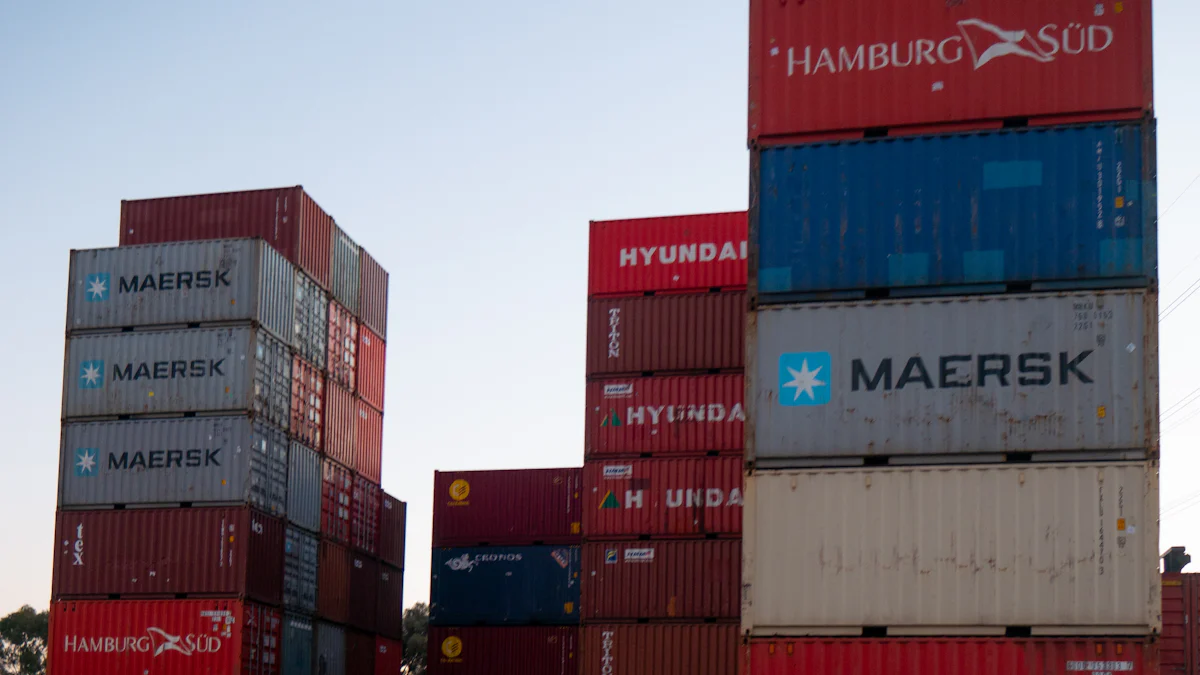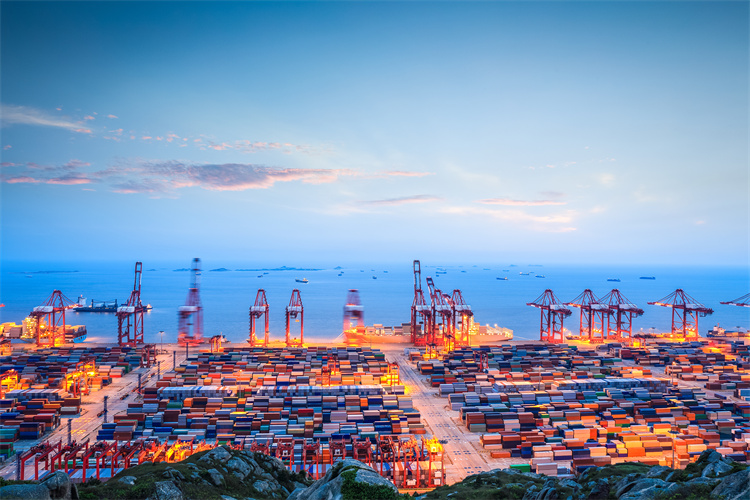Deglobalization of Supply Chains: Fact or Fiction?

The deglobalization of supply chains has emerged as a significant topic in today's economic landscape. Global trade experienced a 3% decline, reaching $31 trillion in 2023. This downturn stemmed from reduced demand in developed economies and weaker trade in regions like East Asia and Latin America. Despite these challenges, projections indicate a positive shift. The first half of 2024 expects an increase of $250 billion in goods trade and $100 billion in services trade. These dynamics highlight the ongoing debate surrounding the future of global supply chains and their evolving nature.
Understanding the Deglobalization of Supply Chains
Definition and Historical Context
What is Deglobalization?
Deglobalization refers to a shift from global interconnectedness to more localized production. This transformation impacts how businesses operate across borders. Companies reassess their supply chains to reduce dependency on international networks. The deglobalization of supply chains aims to enhance security and resilience. Businesses seek to mitigate risks associated with geopolitical tensions and trade disruptions.
Historical examples of deglobalization
Historical Examples:
1929-1939: The Great Depression led to a significant decline in global trade. Countries adopted protectionist measures, such as tariffs and quotas.
World War II: Many nations focused on self-sufficiency due to disrupted international trade routes.
1970s Oil Crisis: The oil embargo prompted countries to reconsider energy dependencies, leading to shifts in trade policies.
These historical events illustrate how global crises can trigger deglobalization. Nations often prioritize domestic stability over international collaboration during challenging times.
Current Relevance
Why is deglobalization a topic of interest today?
The deglobalization of supply chains has gained attention due to recent global challenges. Geopolitical tensions and trade wars create uncertainties for businesses. Companies face pressure to adapt to changing regulations and market conditions. The COVID-19 pandemic exposed vulnerabilities in global supply chains. Businesses experienced disruptions in production and distribution. These factors drive the conversation around deglobalization.
Key factors driving the discussion
Several key factors contribute to the ongoing discussion about deglobalization:
Geopolitical Tensions: Conflicts between major economies affect trade agreements and norms. Businesses must navigate these complexities to maintain operations.
Supply Chain Security: Companies seek to enhance visibility into supply chain practices. Reshoring and vertical integration become viable strategies for risk management.
Technological Advancements: Innovations in automation and digitalization enable localized production. Businesses leverage technology to optimize supply chain efficiency.
Consumer Preferences: Shifts in consumer demand influence production strategies. Companies respond by sourcing materials from diverse geographies.
"Futuristic supply chain leaders can prepare for various future scenarios through enhancing visibility into supply chain practices and disclosures."
These factors underscore the importance of adapting to a rapidly changing global landscape. Businesses must remain agile to thrive in an era of deglobalization.
Evidence for the Deglobalization of Supply Chains

Trends Indicating Deglobalization
Decline in global exports
Global exports have shown a noticeable decline. Many countries experience reduced demand for international goods. The deglobalization of supply chains contributes to this trend. Businesses focus on local markets to minimize risks. The shift away from global trade impacts economic growth. Companies prioritize domestic production over international expansion. The decline in exports reflects changing business strategies. The deglobalization of supply chains influences these decisions.
Impact of geopolitical tensions
Geopolitical tensions affect global trade dynamics. Conflicts between nations create uncertainties for businesses. The deglobalization of supply chains becomes a strategic response. Companies seek stability by reducing reliance on volatile regions. Geopolitical risks drive businesses to reassess supply chain strategies. The need for security and predictability grows. The deglobalization of supply chains addresses these concerns. Businesses adapt to maintain operational resilience.
Case Studies
Examples of companies reshoring production
Several companies have reshored production to their home countries. Businesses aim to enhance supply chain security. The deglobalization of supply chains motivates this shift. Reshoring reduces dependency on international suppliers. Companies benefit from increased control over production processes. The move towards localized manufacturing gains momentum. The deglobalization of supply chains supports this trend. Businesses achieve greater efficiency and reliability.
Role of JUSDA in supply chain management
JUSDA plays a crucial role in supply chain management. The company offers innovative solutions for businesses. The deglobalization of supply chains requires adaptive strategies. JUSDA provides expertise in navigating complex supply networks. Businesses rely on JUSDA for efficient logistics and operations. The company's services enhance supply chain resilience. The deglobalization of supply chains benefits from JUSDA's support. Businesses achieve optimized performance and risk management.

JUSDA Solutions
To provide you with professional solutions and quotations.
Arguments Against the Deglobalization of Supply Chains
Continued Global Integration
Growth of global trade networks
Global trade networks continue to expand despite discussions about the deglobalization of supply chains. Trade in services grew by 8% in 2023, showcasing the resilience of international commerce. Developing countries and South-South trade experienced a 2% increase in imports and exports during the first quarter of 2024. This growth highlights the ongoing integration of global markets. Businesses recognize the benefits of accessing diverse markets and resources. Companies leverage these networks to enhance competitiveness and innovation.
Technological advancements facilitating globalization
Technological advancements play a crucial role in countering the deglobalization of supply chains. Innovations in automation and digitalization streamline production processes. Companies utilize technology to optimize logistics and reduce costs. The rise of e-commerce platforms facilitates cross-border transactions. Businesses can reach international customers with ease. Technology enables real-time communication and collaboration across continents. Companies harness these tools to maintain global operations efficiently.
Counterexamples
Companies expanding international operations
Many companies continue to expand their international operations despite the deglobalization of supply chains. Exports from China, India, and the US increased in the first quarter of 2024. Businesses seek opportunities in emerging markets to drive growth. Companies establish partnerships and subsidiaries abroad to tap into new customer bases. The pursuit of global expansion remains a strategic priority for many organizations. These efforts demonstrate the ongoing commitment to international engagement.
Resilience of global supply chains during crises
Global supply chains have shown remarkable resilience during crises. The COVID-19 pandemic tested the strength of international networks. Many businesses adapted quickly to disruptions and maintained operations. Companies implemented risk management strategies to mitigate challenges. The resilience of global supply chains underscores their importance in today's economy. Businesses recognize the need for diversified sourcing and flexible logistics. The ability to withstand shocks reinforces the value of interconnected supply chains.
Implications of the Deglobalization of Supply Chains

Economic Impact
Increased production costs
The deglobalization of supply chains leads to increased production costs. Companies shift from global to local production. This shift requires investment in new facilities and technologies. Local labor costs often exceed those in developing countries. Businesses face higher expenses for raw materials. The need for compliance with local regulations adds financial burdens. These factors contribute to the rising cost of goods.
Changes in consumer prices
Consumers experience changes in prices due to the deglobalization of supply chains. Higher production costs result in increased retail prices. Consumers may pay more for everyday products. Businesses pass these costs onto consumers to maintain profit margins. The price hikes affect purchasing power. Consumers adjust spending habits to accommodate new price levels. The deglobalization of supply chains influences market dynamics.
Supply Chain Security
Diversification of supply sources
Businesses prioritize diversification of supply sources. The deglobalization of supply chains prompts this strategy. Companies seek multiple suppliers to mitigate risks. Dependence on a single region or country poses threats. Geopolitical tensions and natural disasters disrupt supply chains. Diversified sourcing ensures continuity in operations. Businesses gain flexibility and resilience through varied supply networks.
Risk management strategies
Risk management strategies become crucial in the deglobalization of supply chains. Companies implement measures to protect against disruptions. Contingency plans address potential supply chain failures. Businesses invest in technology to enhance visibility and control. Real-time data helps identify vulnerabilities and respond swiftly. The focus shifts to proactive risk assessment and mitigation. The deglobalization of supply chains demands robust risk management.
The deglobalization of supply chains presents a complex issue. Businesses face challenges and opportunities in this evolving landscape. Companies must adapt to shifting trade dynamics and technological advancements. Supply chain leaders should enhance transparency and simplify operations. These strategies reduce risks and improve efficiency. The future of global supply chains remains uncertain. Leaders have the chance to build resilient and future-fit supply chains. Embracing digital transformation and regional networks will drive growth. Companies must prepare for climate risks and political shifts. Forward-thinking approaches will ensure success in this dynamic environment.
See Also
The Significance of Global Trade Supply Chains
Addressing Globalized World's Supply Chain Growth Hurdles
Exploring Global Consumer Needs Through Jusda Supply Chains
Enhancing Global E-commerce Success with Supply Chain Transparency
